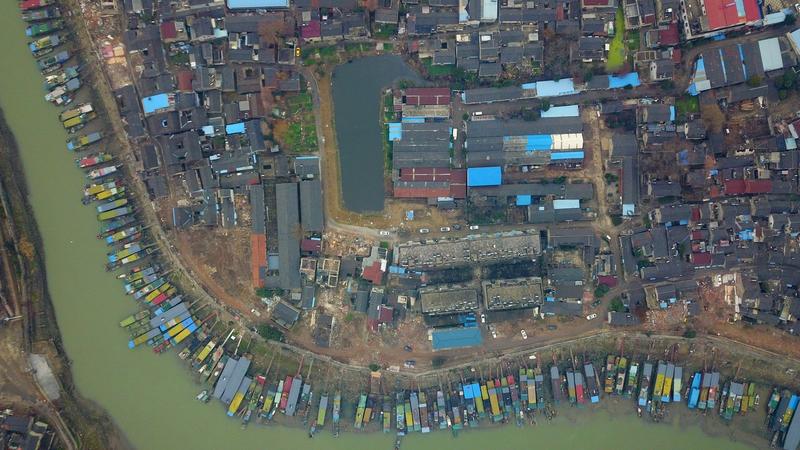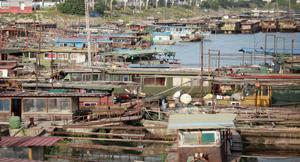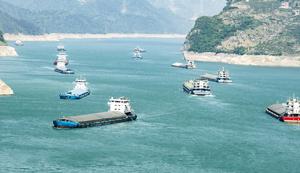Many have left their boats to become protection officers for Asia's longest waterway
 Fishing boats are moored along the bank of the Yangtze in Jiangsu in January, when a 10-year-fishing ban was introduced by the central government. (MENG DELONG / FOR CHINA DAILY)
Fishing boats are moored along the bank of the Yangtze in Jiangsu in January, when a 10-year-fishing ban was introduced by the central government. (MENG DELONG / FOR CHINA DAILY)
As the old Chinese saying goes, "If you live on a mountain, you live off the mountain; if you live by the water, you live off the water."
For hundreds, if not thousands, of years, many people living near the Yangtze River regarded Asia's longest waterway as nothing but a source of food and income.
According to official estimates, more than 113,000 fishing boats and nearly 280,000 fishermen work along the river.
We are fighting to secure a better life for the people living around Poyang Lake and in the Yangtze River Basin
Zhang Chuanguo, former fisherman and now a ranger in a protection team for the Yangtze finless porpoise in Jiangxi province
As the central authorities attached increasingly greater importance to conservation of the Yangtze River, the main body of which flows for more than 6,300 kilometers, a 10-year fishing moratorium was launched at the beginning of the year and implemented in a phased manner.
Saying farewell to their floating businesses, some of them many decades or even generations old, a large number of fishermen have started new lives.
Instead of seeing their incomes fall, however, many have not only become participants in Yangtze conservation but have also benefitted from the national campaign.
Echoing the principle of allowing nature to restore itself, which was included in President Xi Jinping's report to the 19th National Congress of the Communist Party of China in October 2017, the fishing moratorium has come into effect in 332 conservation areas in the Yangtze River Basin.
The ban will be expanded to all the natural waterways of the river and its major tributaries from no later than Jan 1.
In 2016 and 2018, Xi presided over symposiums concerning the Yangtze River Economic Belt. At both conferences, he demanded concerted efforts to protect the Yangtze and avoid excessive development.
"We must proceed with the long-term interests of the Chinese nation to put restoring the ecological environment of the Yangtze River in a dominant position, making all-out efforts to protect it and forbidding large-scale development of the river," Xi said, when chairing the symposium in Wuhan, Hubei province, in 2018.
 A worker breaks up an abandoned fishing boat in Jiangsu province in May. (MENG DELONG / FOR CHINA DAILY)
A worker breaks up an abandoned fishing boat in Jiangsu province in May. (MENG DELONG / FOR CHINA DAILY)
Dwindling resources
More than 300 traditional fishing villages with over 100,000 residents are located in the areas around Poyang Lake, China's largest freshwater body, in the eastern province of Jiangxi, where the ban has been introduced. Many fishermen are embracing new lives ashore.
Shu Yin'an, 53, the third generation of a fishing family, works as a ranger in a Yangtze finless porpoise protection team in Hukou county, Jiangxi.
The finless porpoise, a species endemic to China, is an important indicator of the river's environmental health.
Known for its mischievous "smile", the porpoise is said to have a level of intelligence comparable to that of a gorilla. However, the animal requires an abundant food supply to survive. In recent years, overfishing has contributed to a decline in its numbers.
"I grew up on Poyang Lake and finless porpoises used to be common, but they have rarely been spotted in recent years," said Shu, who decided to wave goodbye to his fishing boat and nets and begin a new life in 2017.
In June of that year, he went back onto the water to start a new career, helping to protect the finless porpoise.
Zhang Chuanguo, Shu's colleague, intended that his two sons should inherit his fishing boats after he retired, but the 65-year-old was frustrated to find that hauls in the once fish-rich lake have dwindled dramatically.
"We shouldn't leave a devastated river for future generations. I'm proud to be a protector of the finless porpoise," he said.
"We are fighting to secure a better life for the people living around Poyang Lake and in the Yangtze River Basin."
Such concerns were responsible for the fishing moratorium. The ban came after decades of human activity-water pollution, overfishing, sand excavation and quarrying-caused serious environmental damage in the river basin.
Last year, public security bureaus investigated over 2,300 cases of illegal fishing, and cracked more than 2,000 from January to May this year, according to the Ministry of Public Security.
Meanwhile, many dams along the Yangtze are also to blame for the environmental damage and the decline in fish numbers because they make it difficult for fish to migrate and reproduce.
 Unused boats are anchored at a dock along the Yangtze River. (MENG DELONG / FOR CHINA DAILY)
Unused boats are anchored at a dock along the Yangtze River. (MENG DELONG / FOR CHINA DAILY)
Niu Xinqiang, head of the Changjiang Institute of Survey, Planning, Design and Research, said that about 24,000 small hydropower stations had been built within the Yangtze River Economic Belt by the end of 2017.
The belt covers all the provincial regions the main body of the river flows through, with the exception of Qinghai province and the Tibet autonomous region. It also includes the provinces of Zhejiang and Guizhou, which boast tributaries of the Yangtze.
"These dams have cut off the passage of migratory fish, resulting in a sharp decline in the numbers of some species," said Niu, a member of the Chinese Academy of Engineering.
In a video conference held in January last year, four central government bodies-the ministries of water resources and of ecology and the environment, along with the National Development and Reform Commission and the National Energy Administration-demanded rectification of outstanding environmental and ecological problems caused by small hydropower stations.
Some of the stations were built illegally and some pose environmental and ecological hazards. According to a media release unveiled after the conference last year, the four government bodies rolled out a joint investigation that will guide the demolition and rectification work this year.
As part of the latest efforts to ensure the implementation of the fishing moratorium, the ministries of public security and of agriculture and rural affairs initiated a three-year campaign to crack down on illegal fishing.
Yu Kangzhen, vice-minister of agriculture and rural affairs, said agricultural authorities at all levels should implement targeted measures against illegal fishing and further improve law enforcement efforts with other departments.
 Cargo vessels sail along the Yangtze in Yichang, Hubei province, in April. (ZHENG JIAYU / FOR CHINA DAILY)
Cargo vessels sail along the Yangtze in Yichang, Hubei province, in April. (ZHENG JIAYU / FOR CHINA DAILY)
Beneficiaries
Wu Huashan, 42, has never regretted his new life ashore, especially as the former fisherman raises crawfish in his 26 hectares of paddy fields.
In just a few months this year, Wu earned more than 300,000 yuan (US$42,860) by selling crawfish-an income he could only dream of during his decades on the water.
Having learned the trade from his parents at an early age, Wu was a skilled fisherman and head of a local fishery association.
"The catches started getting smaller and smaller," he said. "In the past, when I went fishing with my father, we would catch more than 500 kilograms of fish every day. The number has fallen to just a few dozen kg in recent years."
Last year, he bade farewell to his boats and received more than 70,000 yuan in subsidies, plus 12,000 yuan for living expenses and social insurance, paid by the government.
"I was lost and had no idea what I should do," he recalled. With the help of the local government, he finally chose to invest in crawfish, a popular delicacy.
Now he is an expert. "The key to raising crawfish is to keep the water clean. I've had a good harvest this year, and plan to try growing rice in the paddy fields as well," Wu said.
Zhu Yicai, a 67-year-old former fisherman in Yugan county, used to make a living by selling aquatic products from Poyang Lake. Now, he is cashing in on the beautiful lakeside scenery.
Decades of environmental protection have made the lake an important hub for migratory birds, hosting up to 700,000 wintering birds every year. The local government has been taking advantage of this by organizing a range of activities, such as a bird-watching festival, to lure tourists.
The Yangtze, whose drainage basin covers one-fifth of China's land area and is home to about a third of the population, boasts a rich, complex terrain and climate. It also has one of the highest levels of biodiversity in the world.
Zhu's local government has been encouraging fishermen to change jobs and take part in a range of tourism-related businesses by offering training in restaurant management and other skills.
When Zhu opened a fish farm in 2012, he realized that many tourists had actually come to watch the birds. In February 2018, believing that birdwatching would be a good business opportunity, he built a 1,800-square-meter farmhouse that can accommodate about 200 diners at each sitting.
"We closed earlier this year due to the COVID-19 epidemic, but we've already made over 300,000 yuan since we reopened in March," he said. "Many tourists come here to relax and unwind. We can host nearly 200 people at the weekend during high season."
Tourism brought the family income of 1 million yuan last year, and Zhu intends to convert the second floor of his home into a farm-stay to host more tourists.


